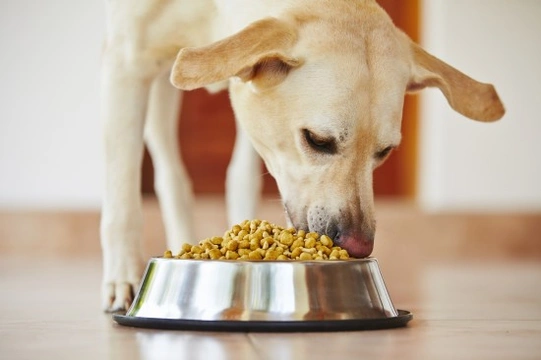Pets
Pets for studWanted petsBreedersAccessories & services
Knowledge hub
Support
Support & safety portal
Why Do Commercial Dry Dog Foods Contain Carbohydrates?
Carbohydrates in dog food have courted controversy in recent years due to the increasing popularity of raw feeding, and the popular view point that domestic dogs should be fed a similar diet to their wild dog and wolf ancestors. It’s widely accepted that wolves and wild dogs do not need carbohydrates in their diet; although some fibre is necessary. To support this argument, raw advocates point out that there are no minimal levels for carbohydrates specified in the AAFCO (Association of American Feed Control Officials) guidelines; nor in those drawn up in the NRC (National Research Council).
However; that is not to say that carbohydrates (at a moderate proportion; and in conjunction with the essential nutrients that a dog needs – namely protein, fat, moisture, fibre, vitamins and minerals) are unnecessary. This much maligned nutrient comes under frequent fire as a “filler”; and it’s often described as cheap, which depending on the source/s used and the quality, is often inaccurate.
Confusion may have arisen in that dog owners are learning about raw nutrition and trying to apply the same principles to commercial dry dog food; which is impossible for two reasons:-
- Dry food contains only about 8% moisture (far less than a raw diet) and is much more calorie dense thus requiring considerably smaller feed portions for a dog used to raw.
- Dry food can never emulate raw feeding due to the heat processing (which alters the structure of the nutrients; particularly the protein).
It is possible to manufacturer lower carbohydrate dry foods, but other nutrients need to therefore be higher to make up the “whole”. Dry foods cannot physically comprise more than 10% moisture, so the protein and fat proportions are raised instead. Carbohydrates are useful in the manufacturing process of extruded and baked foods, and add natural “crunch”, structure and texture to the kibble.
Different nutrient balances suit different dogs. Some may do very well on what is now popularly referred to as the “ancestral diet” or “biologically appropriate diet” - a high protein, low carbohydrate diet. Whilst this may be a great option for dogs with higher energy requirements, the higher fat proportion may mean it is not the ideal choice for all dogs. Some dogs in fact fare better on a diet with more moderate proportions of protein, carbohydrate and fat. Much depends on the individual dog’s digestion and metabolism, and of course which ingredients are used to supply the nutrients. Domestic dogs may share much genetic material with their wild dog ancestors, but they lead very different lifestyles, and this will also impact on the best type of diet for them too.
A raw diet is effectively “diluted” by its higher moisture content, so when the fat and protein are calculated in grams per day, they may not be as high as one would expect despite the fact that feed portions are considerably higher than that of commercial complete dry food. A low carb dry food with a high fat content that is very energy dense may not be a good option for a dog with a large appetite as his portions would be lower than a diet using more carbohydrate since 1g of fat contains more than double the calories of 1g of pure carbohydrate (or protein).
Dogs with nutritionally responsive medical conditions may have special requirements. For example, let’s look at the nutritional management for a dog with chronic loose stools. A high fat diet would not be indicated during his recovery since the enzymes responsible for digesting the fat would struggle to cope. This can result in an accumulation of residue in the large bowel, and when this reaches a certain level, an osmotic reaction may then cause further secretory diarrhoea even if the root cause was a recently diagnosed bacterial infection under appropriate treatment.
So different dogs have different needs, and appropriate ingredients that are commonly used as carbohydrate sources serve several functional purposes too:-
1. They can help the dog to meet his nutritional requirement for glucose, and provide a digestible energy source. By consuming carbs there is no need to use protein as an energy source. This allows the dog to keep the protein for more important functions, such as repairing body tissues, and the manufacture of hormones and enzymes.
2. They supply not only carbohydrate, but other nutrients too which depending on the ingredient may include protein, linoleic acid, vitamins, minerals and fibre.
Carbohydrates may be unpopular with raw feeders due to a comparison of the length of the digestive tract compared to that of people. In dogs it is shorter, and like us, they are unable to digest cellulose. However, they are perfectly well equipped to digest ground and cooked carbs and their lack of salivary amylase is not a hindrance since potent pancreatic amylase and ‘brush border’ enzymes are produced to digest them.
One final consideration when looking at carbohydrates in dog food is the ingredients they are sourced from. Popular carb sources include rice, wheat, oats, barley and maize. Grain-free commercial complete foods tend to use potato, sweet potato, pea ingredients or lentils. Grains are often considered in a negative light, but with other carb sources becoming readily more available, do bear in mind that allergies/intolerance to grain-free carb sources are also a possibility. When considering food allergies, don’t forget that the sensitivity is that of the immune system to dietary proteins. Rice only contains a tiny protein fraction so it’s not especially allergenic, but the reason you may encounter several dogs that can’t eat it is because it is such a popular ingredient meaning many more dogs are exposed to it than those who eat more unusual sources such as peas or lentils.
Good quality whole grains and other named sources of carbs don’t warrant black-listing unless they are known to be problematic for your individual dog.



